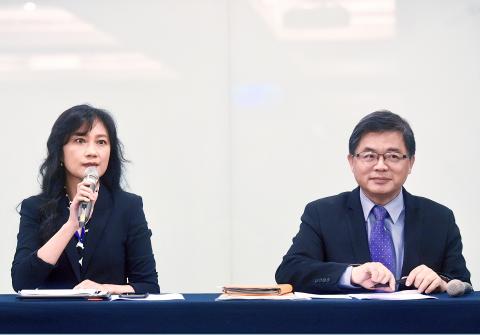The guiding principles behind premier-designate Su Tseng-chang’s (蘇貞昌) Cabinet would be “immediately capable, in touch with the public, communicate well and promote young politicians,” Executive Yuan spokeswoman Kolas Yotaka said yesterday.
Kolas made the remarks at a news conference with incoming Executive Yuan secretary-general Li Meng-yen (李孟諺) to announce the new Cabinet lineup.
Kolas would remain in her position, as Su has asked her to stay, she added.

Photo: Chien Jung-fong, Taipei Times
Several key ministers would stay on in their current roles, incoming Executive Yuan secretary-general Li said.
Minister of Science and Technology Chen Liang-gee (陳良基), Minister of Culture Cheng Li-chiun (鄭麗君) and Minister of Labor Hsu Ming-chun (許銘春) would all stay in their posts, while Pan Wen-chung (潘文忠) would return to his previous post as minister of education, Li said.
Five new ministers would be appointed, while two other positions — the elected National Palace Museum director and the Ocean Affairs Council committee chairperson — would need to be filled, he said.
Su felt that the key ministers were capable in their roles and that by keeping them on they could effectively push forward government policy as quickly as possible, Li said.
Chen performed exceedingly well as minister of science and technology, and many in the industry called for him to stay on, Li said, adding that Chen agreed to remain in the post after Su spoke with him about it.
Pan maintained good communication with the Legislative Yuan when he held the post and it was decided that his return would have a positive effect on the Ministry of Education, Li said.
Su is to be sworn into office today and the Democratic Progressive Party (DPP) has said that while it is confident that the general direction of government policy would remain the same, communication between government departments must be improved.
Su is to focus on maintaining stability and effectively responding to public opinion, Li said.
DPP caucus director-general Lee Chun-yi (李俊俋) said that the party’s losses in the Nov. 24 local elections was the main reason for the Cabinet reshuffle.
The party is aiming to regain public confidence swiftly, he said.
The new Cabinet would prioritize the “livelihood of the people, protection of democracy and defense of the nation’s sovereignty,” as expressed by President Tsai Ing-wen (蔡英文), Li said.
DPP Legislator Hsu Chih-chieh (許智傑) expressed reservations about the Cabinet reshuffle, saying that the minor changes would be interpreted by the public as a lack of sincerity on the part of the DPP.
The DPP should put more “new generation” politicians in key posts to create a sense of “fresh change” and hope in the party, he said.

DAREDEVIL: Honnold said it had always been a dream of his to climb Taipei 101, while a Netflix producer said the skyscraper was ‘a real icon of this country’ US climber Alex Honnold yesterday took on Taiwan’s tallest building, becoming the first person to scale Taipei 101 without a rope, harness or safety net. Hundreds of spectators gathered at the base of the 101-story skyscraper to watch Honnold, 40, embark on his daredevil feat, which was also broadcast live on Netflix. Dressed in a red T-shirt and yellow custom-made climbing shoes, Honnold swiftly moved up the southeast face of the glass and steel building. At one point, he stepped onto a platform midway up to wave down at fans and onlookers who were taking photos. People watching from inside

A Vietnamese migrant worker yesterday won NT$12 million (US$379,627) on a Lunar New Year scratch card in Kaohsiung as part of Taiwan Lottery Co’s (台灣彩券) “NT$12 Million Grand Fortune” (1200萬大吉利) game. The man was the first top-prize winner of the new game launched on Jan. 6 to mark the Lunar New Year. Three Vietnamese migrant workers visited a Taiwan Lottery shop on Xinyue Street in Kaohsiung’s Gangshan District (崗山), a store representative said. The player bought multiple tickets and, after winning nothing, held the final lottery ticket in one hand and rubbed the store’s statue of the Maitreya Buddha’s belly with the other,

‘NATO-PLUS’: ‘Our strategic partners in the Indo-Pacific are facing increasing aggression by the Chinese Communist Party,’ US Representative Rob Wittman said The US House of Representatives on Monday released its version of the Consolidated Appropriations Act, which includes US$1.15 billion to support security cooperation with Taiwan. The omnibus act, covering US$1.2 trillion of spending, allocates US$1 billion for the Taiwan Security Cooperation Initiative, as well as US$150 million for the replacement of defense articles and reimbursement of defense services provided to Taiwan. The fund allocations were based on the US National Defense Authorization Act for fiscal 2026 that was passed by the US Congress last month and authorized up to US$1 billion to the US Defense Security Cooperation Agency in support of the

HIGH-TECH DEAL: Chipmakers that expand in the US would be able to import up to 2.5 times their new capacity with no extra tariffs during an approved construction period Taiwan aims to build a “democratic” high-tech supply chain with the US and form a strategic artificial intelligence (AI) partnership under the new tariffs deal it sealed with Washington last week, Taipei’s top negotiator in the talks said yesterday. US President Donald Trump has pushed Taiwan, a major producer of semiconductors which runs a large trade surplus with the US, to invest more in the US, specifically in chips that power AI. Under the terms of the long-negotiated deal, chipmakers such as Taiwan Semiconductor Manufacturing Co (TSMC, 台積電) that expand US production would incur a lower tariff on semiconductors or related manufacturing